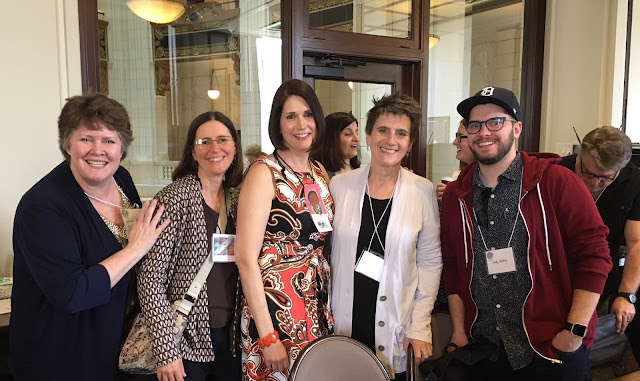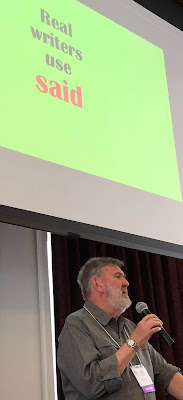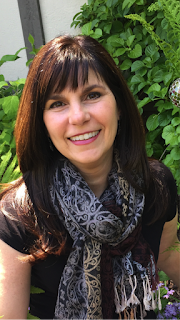Hiring
local comedian, Mike Geeter, to perform at the SCBWI-MI Humor Conference may
have seemed a bit unorthodox, but it was a comical ending to an
information-packed day. In fact, one of my greatest takeaways came from him.
When asked how he handles bombing on stage he responded with a confused look.
“I never bomb,” he said. “I view
every performance a success if I learned something from the experience.”
That’s not to say that Mike doesn’t
have jokes that don’t connect with the audience, or have performances that
don’t quite hit their mark.
He does.
But he refuses to see those
experiences as failures, only as opportunities to improve his stand-up routine.
As a conference coordinator, I’ve
been involved with many conferences. Some great. Some not-so-great.
But Mike was right.
I learned from each experience. Even
the one where a prominent New York agent told me I wasn’t funny. That was one
of my darkest events.
In fact, many things went awry at
that other Detroit Spring Conference, so long ago. But I learned and I kept
going. Kept coordinating with a wonderful group of volunteers, striving to get
just the right location, the funniest, most informative speakers and every detail
hammered out in advance.
At
this year’s event, titled Unearthing Your Funny Bone: Getting Serious about
Writing Humor, editor Mary Kate Gaudet and
publishing pro Heather Alexander (she recently joined Audible) gave us a
glimpse of what they found funny. And one of my personal favorite kid-lit
writer’s in the world, Tim Wynne-Jones (He’s Canadian) provided so much
masters-level craft information I think attendees may have left with
carpal-tunnel syndrome trying to transcribe all his words of wisdom.
But the best part of the conference
was once again getting to collaborate with Charlie Barshaw, Carrie Pearson and
Leslie Helakoski. They weren’t the only ones working behind the scenes, though.
The attendees were greeted bright and early at the registration table by Ashley
and Nick Adkins, and Andy Donahoe. And I would be remiss if I didn’t give a
shout out to our chauffeurs - David Stricklen and Jay Whistler. And Nina Goebel
for her brilliant logo design.
Now,
on to the most important part of the conference: me.
Just kidding. Well, sort of.
My proudest moment at the event was easy
to pinpoint.
It was the opportunity to present my
first-ever SCBWI lecture on the very thing the NYC agent told me I wasn’t
capable of writing.
Humor.
I did the research, formulated the
tools and never once doubted I had what it took to be funny.
Standing up there in front of so
many SCBWI friends and smiling faces was like a holiday trip home. Not a scary
one where your great grandmother loses her dentures and they mysteriously end
up in the Jell-O mold, or one where your alcoholic uncle screams obscenities at
your children. But the good, nurturing kind, where everyone wants to see you
succeed.
Still, I couldn’t help but wonder if
I had bombed.
That inner editor, the mean one that
sounds a lot like the NYC agent, cast his doubtful rhetoric and cynicism my way
and I foolishly let it shake my confidence.
Had
I bombed?
Then Mike Geeter’s words
over-powered that inner editor and I jumped up and screamed, “No, of course
not.”
But I sure as heck may have learned
a thing or two for next time.
Anita Pazner, an SCBWI member and Advisory Committee veteran, has worked on
numerous conferences. She recently completed her MFA in Writing for Children
and Young Adults from the Vermont College of Fine Arts. Her current work
includes a humorous science-based middle-grade novel as well as a serious, YA
historical-fiction story. She also has a stable of unpublished picture books
waiting to find homes. Her first career was in journalism where she worked as a
legal writer, wrote a gardening column and published her own magazine called Michigan Wine Country.
Born in Germany, her first language wasn’t English. It was sarcasm - which
made her a perfect fit for a conference on humor.
Conference attendees enjoyed catching up with colleagues, making new friends, and exploring downtown Detroit. Thanks for sharing your photos, David Stricklen, Betsy McKee, and Deb Pilutti.
 |
| Illustrators: Ruth McNally-Barshaw, Kara Marsee, Heidi Sheffield, Nina Goebel, Cody Wiley |
Coming up on the Mitten Blog: more humor writing tips, experience the Bologna Book Fair, Frida Pennabook answers your writing questions, how to know if your art is ready, and another Writer Spotlight - it could be you!
Are you ready? The submission window opens on June 4th for the second SCBWI-MI Novel Mentorship Competition with mentor Kelly Barson. Read our interview with Kelly here.


















